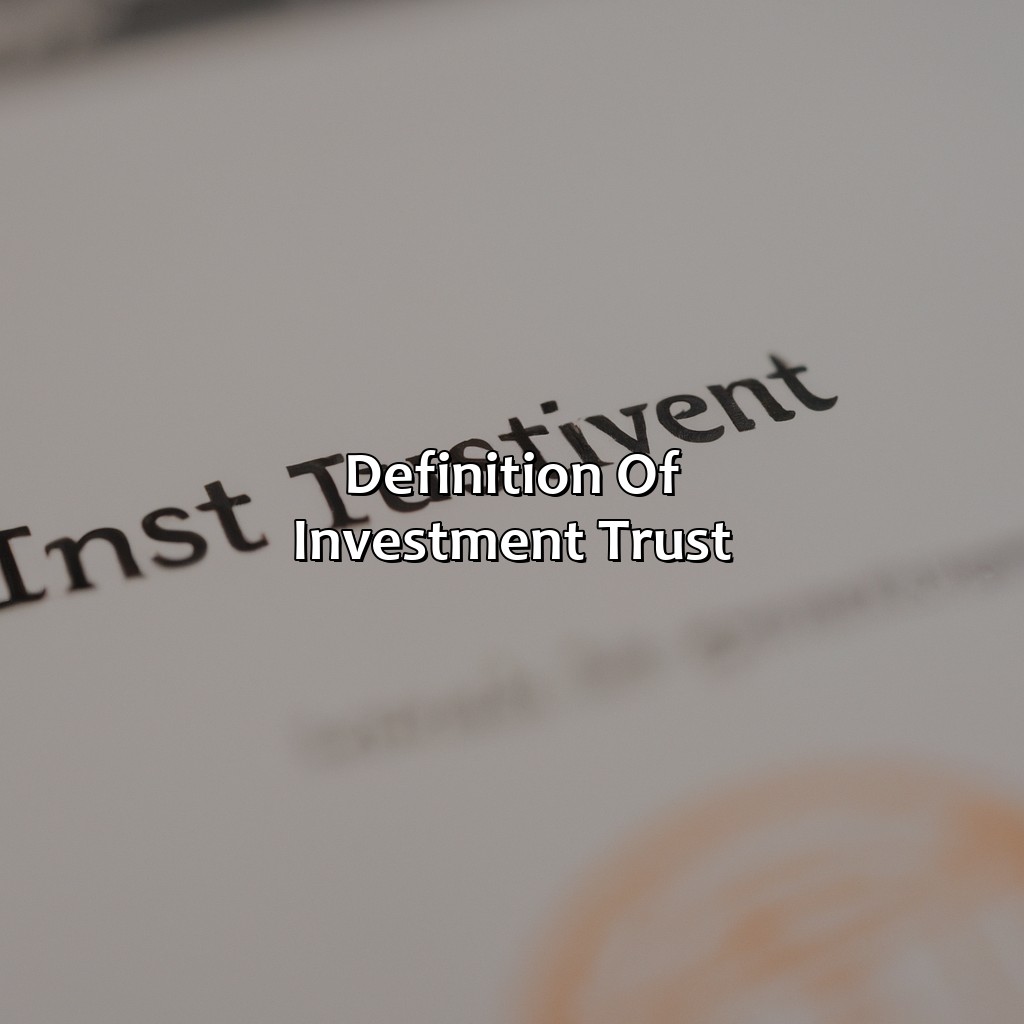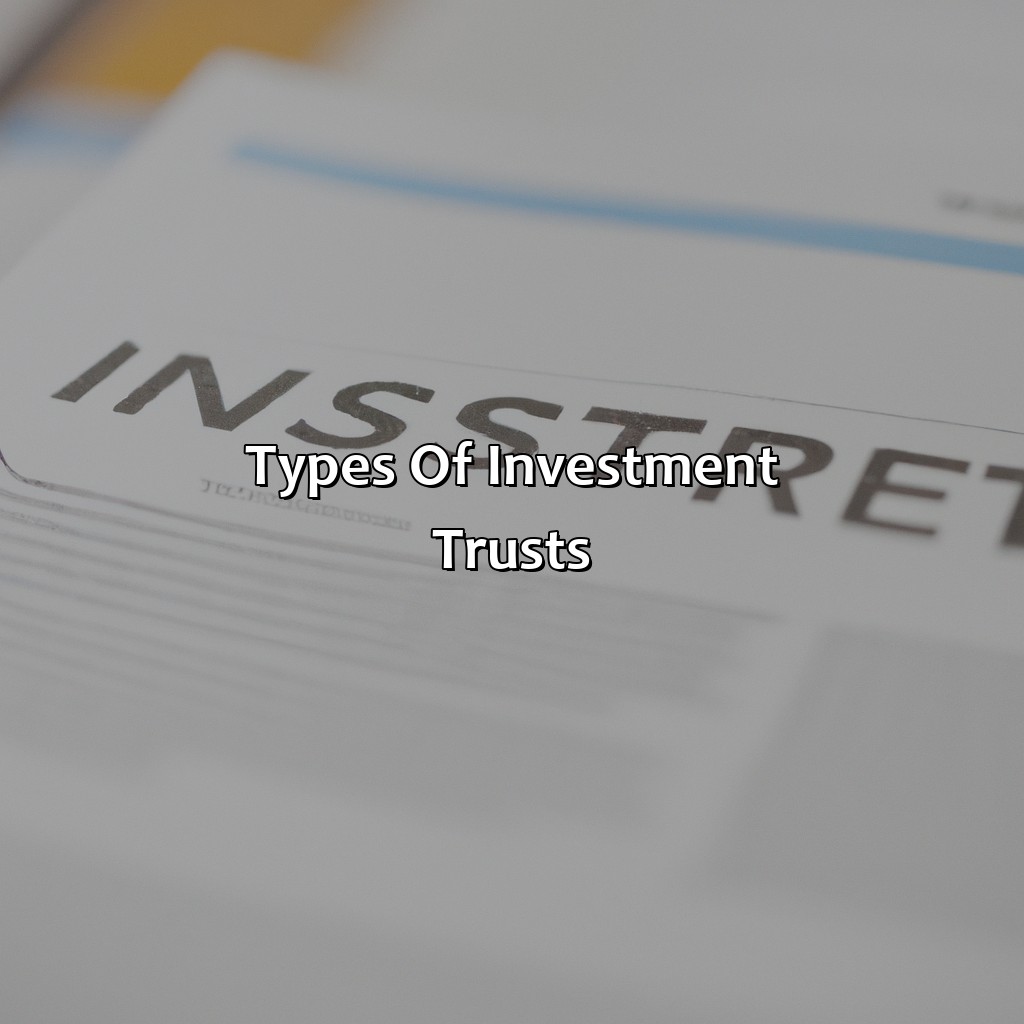What Is A Investment Trust?
Key Takeaway:
- Investment trusts are investment companies that pool funds from multiple investors to invest across a range of assets or securities, providing diversification and professional management that can help to reduce risk.
- There are two types of investment trusts: closed-end and open-end. Closed-end trusts have a fixed number of shares traded like stocks, while open-end trusts allow investors to buy and sell shares on demand.
- Investment trusts offer advantages such as diversification, professional management, and liquidity, with the potential to provide higher returns than traditional savings accounts.
Are you looking to expand your investment portfolio but don’t know where to start? Investment trusts offer you the potential to diversify your investments and benefit from economies of scale. You can capitalize on the experience of professional investment managers and access a wide range of assets. Read on to find out more about this exciting opportunity.
Definition of Investment Trust
Investment trusts are closed-end funds that pool money from investors to buy shares in a diversified portfolio of stocks, bonds, or assets. They are listed on a stock exchange and traded like shares. As a result, their share price can be higher or lower than the actual value of the trust’s assets. Investment trusts are considered a tax-efficient way to invest and generate returns over time. These trusts are managed by a professional fund manager who makes investment decisions on behalf of the investors.
Investment trusts can be actively managed, meaning the investment manager will regularly buy and sell assets within the trust, or passively managed, meaning the trust tracks a market index. In addition to the potential for capital growth, investment trusts also pay out dividends to their shareholders. An investment trust offers a closed-end structure, unlike open-end funds, which are open to new investors and redemptions, and require the fund manager to buy or sell assets accordingly.
It’s worth noting that investment trusts can be riskier than other types of funds, as their performance is closely tied to the stock market. The value of their shares can be more volatile and subject to larger fluctuations. However, with that risk comes the potential for greater rewards.
According to the Financial Times, in 2020, the average investment trust returned 6.2% to its investors, despite the economic fallout of the COVID-19 pandemic.

Image credits: retiregenz.com by James Arnold
Types of Investment Trusts
Investment trusts come in various types, each with distinct characteristics and investment strategies. Understanding the differences between them can help investors make informed decisions. Below is a table showcasing some common types of investment trusts and their key features:
| Type of Investment Trust | Key Characteristics |
|---|---|
| Growth trusts | Invest in companies poised for substantial growth, with higher risk and potential reward |
| Income trusts | Invest in companies that pay regular dividends, offering lower risk and more modest returns |
| Value trusts | Invest in out-of-favor stocks with low valuations, taking advantage of undervaluation in the market |
| Global trusts | Invest in companies across multiple geographic regions or internationally, providing exposure to a broad range of markets |
| Sector specific trusts | Invest in companies within a particular industry or sector, such as technology or healthcare |
It is worth noting that some investment trusts may combine elements of these types, or have additional goals such as environmental or social responsibility. Additionally, it is important to research and consider management fees and expenses when investing in an investment trust.
Investing in an income trust can provide steady income even during market downturns. One investor found success in investing in a high-yielding income trust during the 2008 financial crisis, providing them with a stable source of income during volatile times.

Image credits: retiregenz.com by Harry Duncun
Advantages of Investment Trusts
Investment trusts are a popular investment option known for their unique structure and operational model. Understanding the Advantages of Investment Trusts can help investors make informed decisions and achieve their financial goals.
- Diversification: Investment trusts allow investors to gain exposure to a wide range of securities, providing diversification benefits to their portfolio.
- Professional Management: Investment trust managers are experienced professionals who manage the portfolio, making investment decisions based on thorough research and analysis.
- Access to Specialized Markets: Investment trusts may provide access to specialized or niche markets that may not be easily accessible to individual investors.
- Cost-effective: Investment trusts benefit from economies of scale, which means that the operational costs are spread across a large pool of investors, resulting in lower costs.
- Investment Trusts Offer Better Returns: Investment trusts have a unique structure that allows them to borrow money to invest in securities, boosting their returns potential.
Investment trusts have unique features that set them apart from other investment options. For example, they can retain a portion of their earnings to invest in future opportunities. Moreover, unlike open-ended mutual funds, investment trusts are traded on stock exchanges, allowing investors to buy and sell shares like ordinary stocks.
A renowned investor, Neil Woodford, launched Woodford Patient Capital Investment Trust in 2015, aiming to invest primarily in early-stage and start-up companies. However, the trust faced liquidity issues, and the assets under management shrunk considerably. This episode highlights the need for investors to assess the investment trust’s liquidity terms and the manager’s reputation before investing.

Image credits: retiregenz.com by Harry Duncun
Disadvantages of Investment Trusts
Investment Trusts may have some drawbacks that one must consider before investing their money. Below are three potential disadvantages of Investment Trusts:
- High Fees: Investment Trusts may charge higher fees than other types of investment funds due to their structure and management style.
- Premium or Discount: Investment Trusts may be traded at a premium or discount to their Net Asset Value (NAV), which can introduce potential losses to investors.
- Liquidity: Investment Trusts may have lower liquidity than other types of investments, which means that investors may find it harder to sell their shares quickly.
It is also important to note that Investment Trusts may have features that differ from other investment options. However, by acknowledging and understanding these disadvantages, investors can make an informed decision before investing in Investment Trusts.
Notably, there are unique details that investors should consider before investing in Investment Trusts. Some Investment Trusts may have specialized mandates, which makes the fund only focused on a specific sector or asset class. This may not suit all investors and may carry additional risks.
According to a research report from Wealth Management Association, Investment Trusts have been found to outperform their Open-Ended Fund counterparts by an average of 1% annually over the past decade.
Investment Trusts may be suitable for certain investors, but it is important to understand the potential drawbacks before investing any money.

Image credits: retiregenz.com by Harry Jones
Choosing an Investment Trust
Choosing an Investment Trust
Investment trusts are an excellent way to invest in shares and other assets without the need for active management. Making the right investment in a trust is essential, and requires careful consideration of several factors:
- Reputation: Look for investment trusts with reputable fund managers and a good track record of performance.
- Fees: Make sure to consider the fees and expenses associated with investing in the trust.
- Diversification: Choose funds with a diversified portfolio to minimize risk.
- Sector Focus: Ensure that the investment trust is focused on sectors that align with your investment goals.
It is also important to keep an eye on the trust’s historical performance over time. The investment strategy and portfolio of the investment trust must align with your long term financial goals.
A friend of mine once invested in an investment trust focused on the technology sector. Although the initial returns were good, the fund manager failed to diversify the portfolio and ended up losing a significant amount of money during one sector-specific downturn. Always choose an investment trust that aligns with your goals and is diversified to minimize risk.

Image credits: retiregenz.com by Yuval Washington
Five Facts About Investment Trusts:
An investment trust is a type of collective investment that pools money from many investors to purchase a diversified portfolio of assets. (Source: The Balance)
Investment trusts are traded on stock exchanges like regular stocks, allowing investors to buy and sell shares to participate in the trust’s performance. (Source: Investopedia)
Unlike open-ended funds, investment trusts have a fixed number of shares, so the price can fluctuate based on supply and demand, and may trade at a premium or discount to its net asset value (NAV). (Source: Hargreaves Lansdown)
Investment trusts are managed by a board of directors who appoint the fund manager, and they can use borrowing and gearing to invest in riskier assets and potentially boost returns. (Source: MoneyWeek)
Some investment trusts are focused on specific sectors or regions, while others aim for a broader scope, and they can offer income, growth, or a combination of both to investors. (Source: The Telegraph)
FAQs about What Is A Investment Trust?
What is an investment trust?
An investment trust is a type of investment fund that pools together money from multiple investors to invest in a portfolio of assets, such as stocks, bonds, and real estate.
How does an investment trust work?
An investment trust works by raising capital from investors and then investing that capital in a diversified portfolio of assets. The investment trust is managed by a professional investment management team who make the investment decisions on behalf of the investors.
What are the benefits of investing in an investment trust?
Investing in an investment trust provides several benefits, including access to a diversified portfolio of investments, the ability to invest in assets that might be difficult for individual investors to access, and the potential for long-term growth and income.
What are the risks of investing in an investment trust?
Investing in an investment trust carries risks, including the possibility of loss of the invested capital as well as potential market volatility and investment management risk. It’s important to carefully consider the risks before investing and to consult with a financial advisor if necessary.
How do I invest in an investment trust?
Investing in an investment trust typically involves purchasing shares of the trust through a brokerage or investment platform. Investors can also invest in investment trusts through a tax-advantaged individual retirement account (IRA) or other types of investment accounts.
Can I sell my investment trust shares?
Yes, investors can sell their investment trust shares in the secondary market through a brokerage or investment platform. The price of the shares may fluctuate based on market conditions and demand for the investment trust.
 Checkout this IRS Loophole
Checkout this IRS Loophole 
